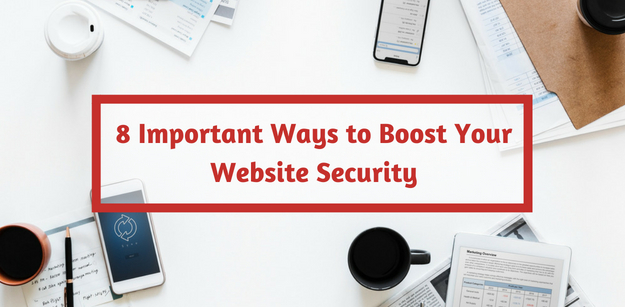With the increasing rate of cyber-attacks, website security is now more important than ever. Safeguarding your business from cyber or digital attackers is crucial to the success of your business. Having multiple layers of defense on your website will help you detect attacks early and help you defend your website effectively. Here are a few web security tips that you can boost your site safety and lower the risks of being another forensic statistic.


Keep software up to date
It is important for business owners to ensure that all the scripts and platforms that they have installed on their website are up to date. Hackers will aggressively target security flaws in the popular web software such as Joomla, WordPress, OS Commerce, Magento, Drupal, and many more. This is why these programs must be updated in order to patch any security loopholes. A huge number of business websites are hacked every day because they use an old version of their software on their business websites. In addition, use of a web application firewall will ensure that your website is protected when you are not quick to roll out the latest software update.
Impose a strong password policy
Every website owner knows that they should have complicated passwords, but not everyone will do this. It is important for you to use strong passwords for your website admin area and server. In addition, you should also insist on strong password policy for your users in order to protect their account security. Hackers usually use sophisticated software that uses brute force to help crack passwords. To protect your website, you must ensure that passwords are complex in nature and contain a mixture of numerals, special characters, lowercase letters, and uppercase letters. It is ideal to have passwords that have at least ten characters and ensure that this password policy is maintained throughout the entire organization.
Backup your data
It is important to ensure that you back up your website regularly. You can avoid losing all your web files and avoid disasters with data backups. This way, you will be sure of restoring all your website information if your website becomes inaccessible after a hacking incident or if all your data is lost. There are countless content management programs that have extensions and plugins that can automatically back up your website and you can also backup content and databases manually. This is a safety precaution and if performed regularly and your information stored on a secure server, then your problem can easily be resolved in a matter of seconds. Remotedba.com offers detailed guidance on website security.
Regularly scan the site for vulnerabilities
It is important for you to carry out web security scans for server and website vulnerabilities. Web security scans must be performed on schedule and after addition or change of any web components. There are a variety of online tools that you can use to measure the level of security of your website. These tools can be quite helpful for brief reviews. However, they will not detect all the security flaws of a website. A professional security company will provide an in-depth review and explanation of all the website vulnerabilities.
Avoid file uploads
Allowing your users to upload files to your site can be a huge website risk. This is because any file can be uploaded and may contain a script that can completely open up your website when executed on your server. If you must have a file upload form, then you should treat all uploaded files with great suspicion. If you allow upload of images by users, then you should never rely on the file extension or mime type when verifying the file as an image because they can be faked. Opening the file, reading the header, and using functions to change the size of the image are not foolproof strategies. This is because most image formats usually have a comment section that may contain PHP code that can be executed by the server.
Encrypt login pages
It is advisable that you use SSL encryption on your login pages. Securing customer information should be your foremost priority especially if it contains sensitive data such as online banking passwords, credit card details, login details, social security numbers, and many more. Installing SSL Certificate will make this information unreadable to everyone else except the destination server. This helps to prevent potential hackers from accessing any login credentials and private data. Websites with SSL certificates assure their visitors that transactions and data are secure and clients can therefore trust such websites to make a purchase. You can gain the confidence and trust of your customers with an cheap wildcard SSL certificate because it guarantees their privacy and security.
Always use a secure host
Choosing a reputable and secure web hosting company is crucial to the security of your website. You must ensure that your host is aware of hacking threats and is determined to keep your site secure. Your host should also back up your web information to a remote server and guarantee easy restoration of this information in the event that your website is hacked. Make sure that you settle with a host who provides ongoing support when necessary.
Hire a security specialist
Developing a close relationship with a company that provides web security services will be a lifesaver as it will ensure your website and content is always secure. Even though there are minor things that you can handle on your own, there are countless security measures that should be left to the experts. Companies that offer online security services can scan your website regularly for vulnerabilities, monitor any malicious activity, perform comprehensive website security audits, and be there for you whenever you need any repairs.
Your website data is the newest currency for your business and this is why you must invest in website security. Businesses must be proactive in securing their information across the system level, drive level, networks, and within the cloud environments and services. When you follow the aforementioned best practices for website protection, you will be able to compete effectively in the digital world and save your business from any expensive data breaches or loss.



